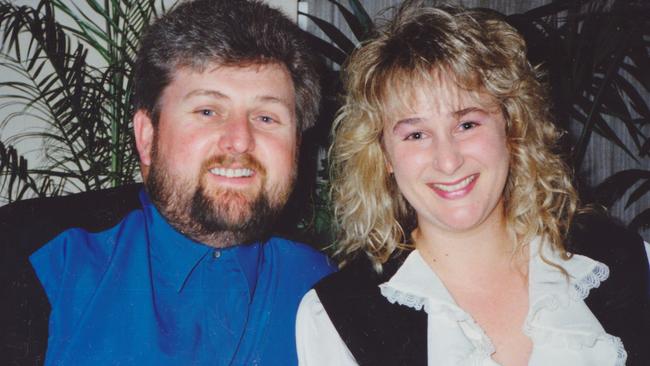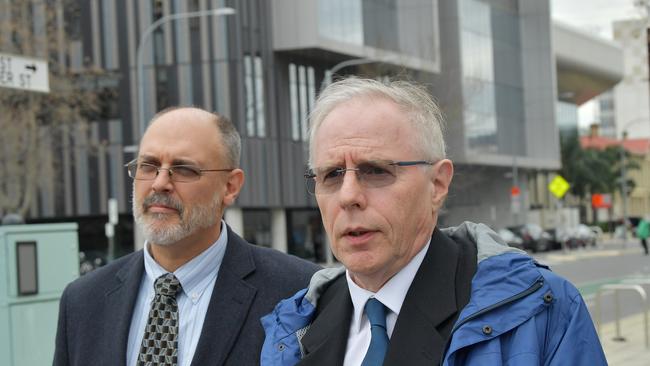Coroner told two specialist doctors refused help in the months before deaths of Michael John Russell and Leslie Robert Graham
TWO senior SA doctors assured their bosses they could handle the 24-hour stroke service in the months before two patients died during a rostering blunder — despite being given the chance to appoint a third specialist, an inquest has heard.
- Inquest told: Error to have stroke specialists on leave at same time
- Patient records system ‘dangerous, unfit for purpose’
- Builders launch new legal action one month out from nRAH opening
- More staff sacked in wake of Oakden scandal
TWO senior SA doctors assured their bosses they could handle the 24-hour stroke service in the months before two patients died during a rostering blunder — despite being given the chance to appoint a third specialist, an inquest has heard.
Coroner Mark Johns is holding an urgent inquest into the deaths of stroke patients Michael John Russell, 60, and Leslie Robert Graham, 81, who died when the Royal Adelaide Hospital’s only two Interventional Neuro-Radiology (INR) specialists were on leave at the same time.
Dr James Taylor and Dr Rebecca Scroop were both on leave in April and were unavailable to do the procedures.
The procedures were done by the state’s only other fully accredited INR specialist, Dr Steve Chryssidis, but were unsuccessful.
On Wednesday, SA Medical Imaging executive director John Kolovos told Mr Johns he had found the funding to appoint a part-time INR specialist at the RAH in February — two months before the deaths.
He said a meeting was held with Dr Scroop, Dr Taylor and their boss Dr Jim Buckley about candidate Dr Lan Ahn Do.
But he said the two doctors outlined a number of concerns about Dr Do, including that she needed to be “shadowed” because she was not fully accredited yet.
“The clinicians did not feel they wanted to appoint her at that time,” he said.
“I was aware they wanted an INR specialist and I was surprised because here was an opportunity to appoint one and they didn’t.

“I was guided by Dr Scroop and Dr Taylor in that they assured me they had been managing the service for years without incident.”
He said the recruitment process was abandoned after that February meeting.
But Mr Johns questioned Mr Kolovos about whether he was concerned the critical service was being provided by only two people.
“Do you realise that effectively two people were covering 24 hours a day, seven days a week, 52 weeks a year,” he said.
Mr Kolovos responded: “I did understand that.”
“In your mind, wouldn’t that be a matter of even greater concern — how long can two people do this for?” Mr Johns asked.
Mr Kolovos replied: “They had provided me with reassurances they would be able to maintain that service.”
The inquest has previously heard Dr Scroop and Dr Taylor earned $1.1 million a year and may have been protective of their financial prospects.
He also told the inquest that he did not mention Dr Chryssidis’ name during the meeting as a possible candidate for the role.
Mr Johns asked: “How could his name not come up? Wouldn’t it have been an obvious thing to raise — surely it was an obvious thing for you to raise then and there.”
Mr Kolovos said he knew there was “animosity” between Dr Scroop and Dr Chryssidis but that was not the reason he didn’t put him forward.
“Are you sure about that?,” Mr Johns asked.

“Are you sure you didn’t feel inhibited from raising a very, clear and obvious strategy because I can’t think of any other explanation for why you wouldn’t raise it.”
Mr Kolovos said he was not.
When questioned by Michael Tilley, acting for Dr Taylor, about whether the doctor was actually on leave for the February meeting, Mr Kolovos conceded it was a possibility but thought he was there.
John Homburg, acting for Dr Scroop, also asked Mr Kolovos if his client discussed Dr Do’s “clinical competency” at the meeting and how she wanted a full-time INR specialist, not part-time.
Mr Kolovos said he did not recall either being mentioned by Dr Scroop.
Dr Buckley last week told the inquest the rostering blunder was an “error” while Mr Johns has questioned the hospital’s “casual” approach to health administration.
An internal SA Health review found there had been “longstanding, territorial” issues between the three stroke specialists employed by SA Medical Imaging — Dr Taylor, Dr Scroop and Dr Chryssidis.
Dr Taylor, Dr Scroop and Dr Chryssidis will give evidence later. The inquest continues.
